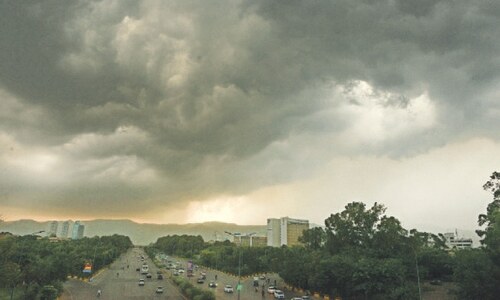
Warehouses constructed in the subcontinent in 1945 have continued to serve their purpose today in Rawalpindi, where seven pre-partition wheat storage centres are in use.
The preservation of wheat grain is an age old practice because of how central wheat flour has been to human diets. Back then, farmers used to construct mud rooms to store grain and protect them from moisture and insects.

But World War Two became a turning point in the subcontinent. At the time, the British decided they needed to set up a food department to manage scarcity, and constructed warehouses in the main cities of the Indian subcontinent to meet the deficiency of food in areas under the control of the British.
After partition, the civil supplies department became the food department. Seven wheat storage centres were set up before partition in Rawalpindi around the main railway line, including I -11 near the Railways Carriage Factory, on Tipu Road and in Sihala, Kahuta, Gujar Khan and Taxila.
There are 32 stores on Tipu Road that can store almost five million metric tons of wheat, while nine godowns in Sihala can store 10,000 metric tons and four in Kahuta can store 1,000 metric tons.

The warehouses have been constructed in the barracks style, and are used to protect the grain from moisture and insects without the use of chemicals. Although there are more modern ways to store wheat grain, such as in steel silos, the government is still using older methods, including sealing doors and ventilators of the warehouses with mud during the monsoon, at its facilities.
Workers are also involved in the effort. People are hired to work at the warehouses to protect the stored grain from thieves and insects.
“In the old days, the food department stores a number of articles including wheat flour, grain, rice, pulses, vegetable oil and sugar. Until 1984-85, these items were rationed by the food department, but in the Mohammad Khan Junejo regime atta and rice were deregulated and these warehouses used for wheat grain storage,” Assistant Food Controller Khurram Saqib told Dawn.
He said the government procures wheat at fixed “support prices”and supplies to flour mills at subsidised rates. All the wheat grain procured from farmers is stored in warehouses in the main cities of Punjab.

“Wheat is not produced in Rawalpindi. To meet the deficiency of wheat, the government transfers wheat sacks from areas with a surplus, including Multan, D.G. Khan, Sargodha and other areas,” Mr Saqib said.
He added that the government transports the wheat to Rawalpindi so it can supply it to flour mills according to the quota allocated to them. The grain is then ground and people can buy wheat flour (atta) at subsidised prices determined by the government, he said.
Mr Saqib said that the government has to protect the interest of farmers on the one hand and ensure they get their due return on their produce, as well as consumers and make sure they can buy atta, a staple food, at an affordable price.
Published in Dawn, January 12th, 2020















































Dear visitor, the comments section is undergoing an overhaul and will return soon.